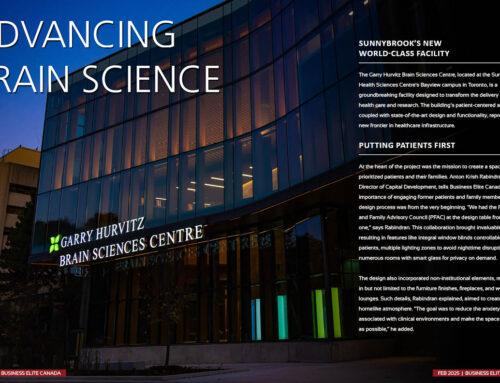Developing tools for the fight against disease
~ By Cheryl Long
Producing a better missile is one of the driving forces behind the research team at Anogen in Mississauga, Ontario. But the high-tech tools they’re creating aren’t used in traditional warfare. Instead, Anogen is in the business of creating “biological missiles,” or antibodies designed for both research and the diagnosis and treatment of disease.
Formally known as Yes Biotech Laboratories Ltd., the Canadian biopharmaceutical company has been working since 1989 to design and develop antibody-based therapeutic and diagnostic agents used in the fight against a range of diseases, including inflammation, autoimmune disorders, cardiovascular diseases and cancer. The antibodies they develop are known as “missiles” because they aim for specific target molecules produced by invading pathogens, cancer cells or host cells during severe inflammatory responses. The antibody tracks the “target,” allowing it to be detected during diagnosis or neutralized in cases where it would cause disease.
Founded by Dr. George Q. Ye in the United States in 1988, the company was relocated to Mississauga in the following year where they still maintain their main office and research lab. Today, they also have offices in Orlando, Florida and Shanghai, China, and another research facility in Xuzhou, Jiangsu Province, China. Antibodies are a vital part of the health sciences industry, and Dr. Ye has dedicated his work to the development of a broader range of novel antibodies aimed at the detection and neutralization of molecular targets in disease.
Anogen products are sold worldwide
Their products are sold to customers worldwide with approximately 70 percent of their distribution going to the United States and the remainder being sent to Europe. Their clients are varied— scientists from universities, research institutions, hospitals, pharmaceutical companies and contract research organizations (CROs) — and they rely on the antibodies produced by Anogen to conduct groundbreaking life science research.
Antibodies are essential in the treatment of disease. Some can cure diseases caused by invading microorganisms or abnormally increased mediators produced during inflammatory responses by blocking the protein function; others are able to identify cancer cells and differentiate them from normal cells to aid in diagnosis and treatment. One of Anogen’s greatest resources is its antibody/cell “bank,” which is one of the largest in Canada. Containing a wide source of unique antibodies that are able to recognize various inflammatory and infectious factors, these antibodies could eventually be used in the treatment of infectious diseases, cancer and autoimmune diseases.
The company’s current and main project revolves around the creation of a new biodefense strategy to prevent cytokine storms, potentially fatal immune reactions that can cause significant damage to the body’s tissues and organs and, in some cases, lead to death. When people contract an infection, their immune systems produce cytokines to treat the infection, Dr. Ye explained. But in some cases, the immune system loses control and overproduces cytokines, and the result can be worse than the initial infection.
A cytokine storm can occur in response to a number of infections that afflict the human population, including H1N1 flu, sepsis, smallpox, Ebola and avian influenza. Surprisingly, healthy young adults may be at greater risk than others because their strong immune systems spark the cytokine storm. Anogen’s strategy is two-fold: provide immunity against the initial disease and create a therapy that can neutralize the body’s exaggerated immune response. Not only is this important in the case of infectious diseases, but it is also instrumental in responding to a situation like a bioterrorist attack, Dr. Ye explained.
Antibodies used to treat many diseases
Utilizing antibodies to treat disease isn’t a new concept. Historically, they’ve been crucial in cases of anthrax, plague, rabies, and spider and snake bites, going back as far as the late 19th century. Their natural properties mean that they have only minimal toxicity, and they provide immediate immunity against the disease that can last for weeks or even months.
Anogen has been instrumental in developing technology used in treatments for skin ailments such as psoriasis, eczema, acne and rosacea. A topical cream known as Abcream, used to treat psoriasis and eczema, has gone through multi-phase clinical trials in 18 hospitals in China and has been approved by the country’s State Food & Drug Administration. International patents have been granted by other countries for the promising new treatment.
The company’s team of research scientists are looking to the future, working to discover unknown inflammatory factors and their targets and then develop effective antibodies, which are the key to the future treatment of disease. To learn more about Anogen and their innovative work in research and development, visit www.anogen.net.







